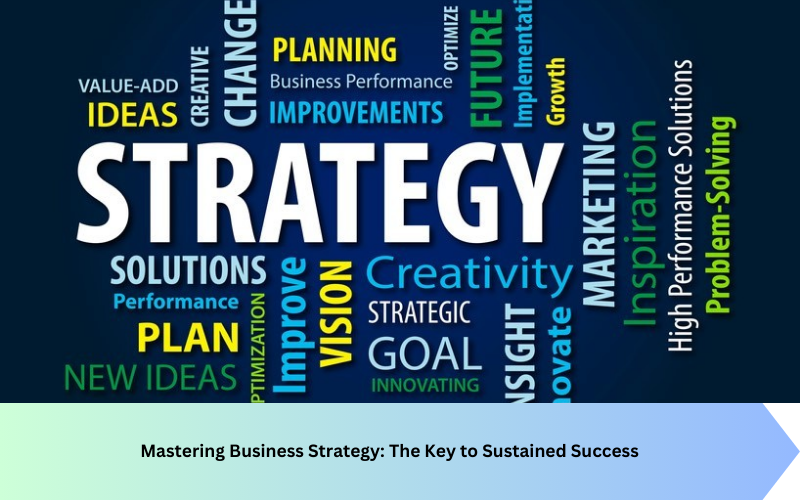What is Business Strategy?
Business strategy is the comprehensive plan that companies use to achieve their goals and objectives. It’s like a roadmap guiding every decision and action towards the desired destination. Whether you’re a small startup or a multinational corporation, a solid business strategy is crucial for success.
Importance of Business Strategy
Why is business strategy so important? Simply put, it provides direction and focus. Without a strategy, businesses can easily lose their way, making decisions that are inconsistent and inefficient. A well-defined strategy helps align resources, prioritize actions, and navigate the complexities of the market.
The Evolution of Business Strategy
Business strategy has evolved significantly over time. In the early days, strategies were simple and often reactive. Today, they are sophisticated, data-driven, and proactive, incorporating advanced technologies and comprehensive market analysis.
Key Components of Business Strategy
Vision and Mission Statements
Your vision and mission statements are the foundation of your business strategy. The vision statement defines what you aspire to achieve in the long run, while the mission statement outlines your purpose and the value you provide to your customers.
Core Values
Core values are the principles that guide your company’s behavior and decision-making processes. They reflect your company’s culture and can significantly influence your business strategy.
Goals and Objectives
Setting clear goals and objectives is crucial. Goals are broad, long-term achievements you strive for, whereas objectives are specific, measurable steps you take to reach those goals.
SWOT Analysis
A SWOT analysis helps you understand your Strengths, Weaknesses, Opportunities, and Threats. This analysis is a vital tool in developing a robust business strategy, enabling you to leverage your strengths, mitigate your weaknesses, capitalize on opportunities, and guard against threats.
Types of Business Strategies
Corporate Strategy
Corporate strategy focuses on the overall scope and direction of the company. It involves decisions about which markets to enter, how to allocate resources, and how to achieve growth.
Competitive Strategy
Competitive strategy is about gaining a competitive advantage in the marketplace. It includes tactics like cost leadership, differentiation, and focus strategies.
Operational Strategy
Operational strategy focuses on how to efficiently manage day-to-day operations. This includes optimizing processes, improving productivity, and ensuring quality.
Functional Strategy
Functional strategies are specific to different departments within a company, such as marketing, finance, or human resources. These strategies align with the overall business strategy to achieve the company’s goals.
Developing a Business Strategy
Market Research
Understanding your market is the first step in developing a business strategy. This involves analyzing industry trends, customer behavior, and competitor activities.
Setting SMART Goals
SMART goals are Specific, Measurable, Achievable, Relevant, and Time-bound. Setting SMART goals ensures your objectives are clear and attainable.
Resource Allocation
Allocating resources effectively is crucial. This includes financial resources, human capital, and technological assets.
Risk Management
Identifying and managing risks is a critical aspect of business strategy. This involves assessing potential risks and developing strategies to mitigate them.
Implementing Business Strategy
Action Plans
An action plan outlines the steps needed to achieve your strategic goals. It includes timelines, responsibilities, and resources required.
Communication Strategies
Effective communication is key to successful strategy implementation. This involves keeping all stakeholders informed and engaged.
Performance Metrics
Measuring performance is essential to track progress and make necessary adjustments. This includes setting up key performance indicators (KPIs) and regularly reviewing them.
Continuous Improvement
Continuous improvement involves regularly assessing and refining your strategies to ensure they remain effective and relevant.
Case Studies of Successful Business Strategies
Apple Inc.
Apple’s business strategy focuses on innovation, premium pricing, and a strong brand. Their commitment to design and user experience has set them apart in the technology industry.
Amazon
Amazon’s strategy revolves around customer obsession, operational efficiency, and constant innovation. Their focus on long-term growth over short-term profits has led to their dominance in e-commerce.
Google’s strategy includes diversification, innovation, and maintaining a strong corporate culture. Their emphasis on research and development has kept them at the forefront of the tech industry.
Tesla
Tesla’s strategy is driven by a vision of sustainable energy. Their focus on innovation, quality, and customer experience has made them a leader in the electric vehicle market.
Challenges in Business Strategy
Adapting to Market Changes
Markets are dynamic, and adapting to changes is a significant challenge. This requires flexibility and the ability to pivot strategies when necessary.
Managing Competition
Competition is fierce in most industries. Staying ahead requires constant innovation and strategic thinking.
Overcoming Internal Resistance
Implementing new strategies often faces internal resistance. Effective leadership and communication are essential to overcome this challenge.
Sustaining Long-term Growth
Sustaining long-term growth requires a balance of short-term wins and long-term investments. It also involves continuous monitoring and adjustment of strategies.
The Role of Leadership in Business Strategy
Visionary Leadership
Visionary leaders inspire and guide their teams towards achieving the company’s vision. They play a crucial role in shaping and executing the business strategy.
Decision-Making Processes
Effective decision-making processes are vital for successful strategy implementation. Leaders must be able to make informed and timely decisions.
Team Building and Management
Building and managing a strong team is essential. This involves recruiting the right talent, fostering a positive culture, and ensuring team alignment with the strategy.
Innovation and Strategic Thinking
Leaders must encourage innovation and strategic thinking within their teams. This involves creating an environment that supports creativity and critical thinking.
Technological Influence on Business Strategy
Digital Transformation
Digital transformation involves integrating digital technology into all areas of business, fundamentally changing how you operate and deliver value to customers.
Data-Driven Decision Making
Leveraging data for decision-making is a game-changer. It allows businesses to make informed decisions based on insights and trends.
E-commerce and Online Presence
A strong online presence is crucial in today’s digital age. This includes having an effective e-commerce strategy and utilizing digital marketing.
AI and Automation
AI and automation are transforming businesses. They help improve efficiency, reduce costs, and enhance customer experience.
Sustainability and Business Strategy
Corporate Social Responsibility
Corporate social responsibility (CSR) involves taking responsibility for the impact of your business on society and the environment. It’s an important aspect of modern business strategy.
Green Business Practices
Adopting green business practices helps reduce your environmental footprint. This can also enhance your brand image and appeal to eco-conscious consumers.
Ethical Considerations
Ethical considerations are crucial in business strategy. This involves ensuring your business practices are fair, transparent, and ethical.
Long-Term Sustainability Goals
Setting long-term sustainability goals ensures your business remains viable in the future. This involves balancing economic, social, and environmental factors.





